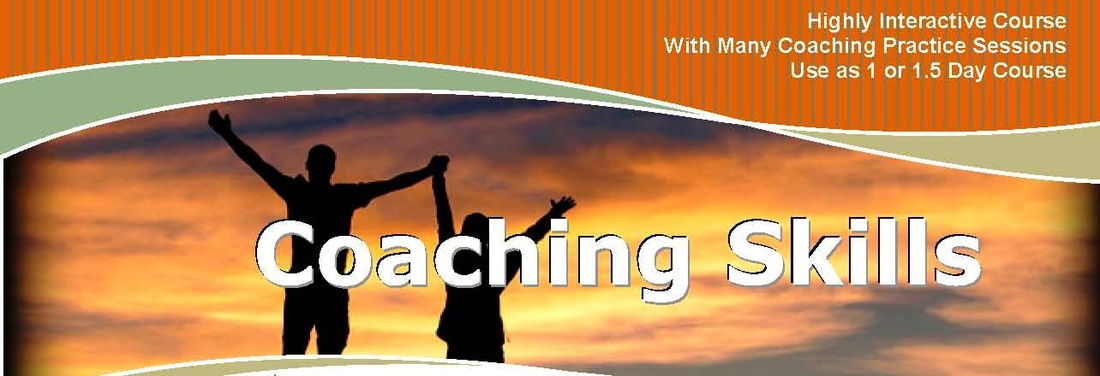Highly Interactive Course With Many Coaching Practice Sessions Use as 1 or 1.5 Day Course | Audience: Anyone Prerequisites: None Program Duration: 1 or 1.5 days. The course contains a lot of content for just a single day and there are many practical exercises that can easily be extended to cover more than one day. Course Level: Beginners & Intermediate | ||
Course Description
“There is no such thing as failure. There are only results.”
Anthony Robbins
Coaching is increasingly becoming one of the most sought after and important skills for anyone in a work environment. It is a skill that no manager can live without. The days of direct commands from managers to their employees are long gone. The importance of inspiring and guiding employees to realize their abilities and discover their power and responsibilities can no longer be ignored.
This is why any successful company is now deeply interested in formal and informal coaching carried out continuously in the workplace.
“There is no such thing as failure. There are only results.”
Anthony Robbins
Coaching is increasingly becoming one of the most sought after and important skills for anyone in a work environment. It is a skill that no manager can live without. The days of direct commands from managers to their employees are long gone. The importance of inspiring and guiding employees to realize their abilities and discover their power and responsibilities can no longer be ignored.
This is why any successful company is now deeply interested in formal and informal coaching carried out continuously in the workplace.
| | Contains example coaching conversations and guidelines on how to conduct effective coaching. Trainer guides are provided to run coaching exercises to teach coaching. |
Coaching is not limited to managers and team leaders. Coaching skills are essential in helping and
inspiring your colleagues, friends and family. This program focuses on the latest proven methods of
coaching and covers important topics such as structuring effective communications, successful
questioning methods and active listening techniques,
the GROW model, human behavior, motivational conversations, giving feedback or praise and many
other relevant topics.
This program will introduce you to the mentality of successful coaches, the effective methods of
managing resistive or defensive coachees, the ability to control your emotions and to use others in
inspiring and directing them towards achieving their goals.
We have always been told what to do by our parents, teachers, boss or even our
colleagues. Telling however, has proven ineffective when it comes to successful coaching. This session
will teach you about sound and fundamentally proven coaching techniques which promise clear
vision, measured objectives and great results for coachee.
inspiring your colleagues, friends and family. This program focuses on the latest proven methods of
coaching and covers important topics such as structuring effective communications, successful
questioning methods and active listening techniques,
the GROW model, human behavior, motivational conversations, giving feedback or praise and many
other relevant topics.
This program will introduce you to the mentality of successful coaches, the effective methods of
managing resistive or defensive coachees, the ability to control your emotions and to use others in
inspiring and directing them towards achieving their goals.
We have always been told what to do by our parents, teachers, boss or even our
colleagues. Telling however, has proven ineffective when it comes to successful coaching. This session
will teach you about sound and fundamentally proven coaching techniques which promise clear
vision, measured objectives and great results for coachee.
In this highly practical course delegates will learn:
What is Coaching
What is Coaching
- What is the difference between coaching and other kinds of instructional methods?
- How should you sequence your coaching?
- What should you talk about first?
- What are the principles of coaching that you must adhere to?
- What is formal and informal coaching and how do they differ?
- What are the best formal systems of coaching and how can you implement them at work?
- How can you integrate your coaching with HR performance appraisals?
- How to raise the awareness of a coachee?
- How can you use coaching in line with your management responsibilities?
- What is peer coaching?
- What is the GROW model?
- What kinds of questions should you ask in each stage of the GROW model?
- How to encourage others in the right direction?
- How do humans learn and how can you use their natural learning habits while coaching to get maximum results?
- What kinds of questions are ineffective in coaching and why?
- What results do you obtain from asking each type of question and how can you use this knowledge to coach?
- What types of questions can you ask and what are their pros and cons?
- What are open and closed questions and how can they help when coaching?
- What are the main human needs?
- How to benefit from a variety of behavioral models to predict and motivate others?
- How to take advantage of the power of motivation in coaching?
- How to Give Feedback
- How to assess the coachee and provide valuable guidance?
- How to give effective feedback?
- How to overcome internal barriers while coaching?
- How to overcome resistance to change or coaching?


 RSS Feed
RSS Feed